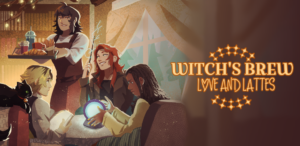Oct 14
2025
Heart’s Choice Author Interview: Cay Macres, “Witch’s Brew: Love and Lattes”
Posted by: Mary Duffy | Comments (17)

Will you spill the tea about the secret, cozy magical cafe on the college campus? Brew potions and romance on coffee dates with your new friends!
Witch’s Brew: Love and Lattes is a 426,000-thousand word interactive cozy romance novel by Cay Macres. I sat down with Cay to talk about their writing and upcoming game! Witch’s Brew: Love and Lattes releases next Thursday, October 23rd. You can wishlist it on Steam today, it really helps, even if you don’t plan to purchase on Steam.
This is definitely not your first time writing in the game-space. Tell our readers about your background.
My first step into games was working on game jams with friends, doing dialogue and narrative design. After that, I was a contract writer for StoryLoom, an interactive novel site by Pixelberry Studios. I had always been drawn to sci fi but, with StoryLoom, I discovered how much fun fantasy is!
How did you get interested in interactive fiction?
A lot of my favorite games are cozy RPGs with strong narratives. I also love reading fantasy and sci fi! I really appreciate that interactive fiction feels like the middle point between RPGs and traditional novels.
You’ve also got some novels under your belt?
I haven’t yet published any non-interactive novels. I have a couple in the works that I’m still editing. As a writer, it’s difficult to ever feel truly done with a project.
What was your favorite part of writing this game?
I’m a writer who loves describing things, so I had fun creating the cozy, coastal, autumnal vibes of Peridot Pines! I also enjoyed figuring out all the lore around magic. And, of course, I loved writing the cat’s snarky dialogue. I tried my best to channel my own two tabbies.
If you were the PC, who would you be romancing?
I think I would romance Mel. The type of romances I enjoy are usually the shy, will-they-won’t-they, slow-burns.
What are you working on next?
Next, I hope to wrap up editing and finally start querying agents to get my non-interactive novels published! I also want to write more flash fiction. I find that it’s a helpful warm-up that reminds me how much a single word can alter a story.

 Steam
Steam Twitter
Twitter Facebook
Facebook Tumblr
Tumblr RSS Feed
RSS Feed


Looks like a fun addition to the Heart’s Choice library! Cozy fantasy is delightful. Congrats on completing the project!
I had so much fun testing this! It was so many things I love: cozy magic autumnal academia. I wish I could visit Peridot Pines and hang out with these characters for real. I’ll need to look up this author so I know when she gets one of those traditional novels published - if it’s anywhere near as good as this game, I know I’ll savor it!
…Or, in the alternative, to self-publish them on Amazon, why not.
BTW, what is cozy fantasy?
It’s a fantasy subgenre that focuses on relatively gentle, low-stakes stories.
Here’s a description from Pan Macmillan:
So, I would expect this game to be a sweet slice-of-life story.
Cozy fantasy is a subgenre of fantasy that focuses on low-stakes, character-driven, feel-good stories, often with themes of found family. Some popular cozy fantasy titles are Howl’s Moving Castle, The House in the Cerulean Sea, and Legends & Lattes.
Witch’s Brew is a story about a character’s first semester of college, including studies, making new friends (and possibly falling in love), exploring the town, and working at a coffee shop. Instead of saving the world, slaying a dragon, or defeating an evil empire, the PC’s goals are are to pass their classes and keep the coffee shop open. That’s cozy fantasy.
As for how to publish, there are a lot of reasons why authors choose to pursue traditional publishing rather than self-publishing. There are a few authors who have made a good career for themselves self-publishing, but it’s very rare. Self-published authors obviously don’t get advances on royalties, and although they get higher royalty rates than traditionally published authors, that doesn’t mean much if they don’t get sales. Traditional publishers take care of things like cover art, editing, and promotion; self-published authors have to arrange all of that themselves (or it doesn’t get done at all). Traditional publishers have connections with booksellers, awards committees, film studios, etc., opening opportunities to their authors that are difficult or impossible for self-published authors to obtain. So … there’s a very good reason “why not.”